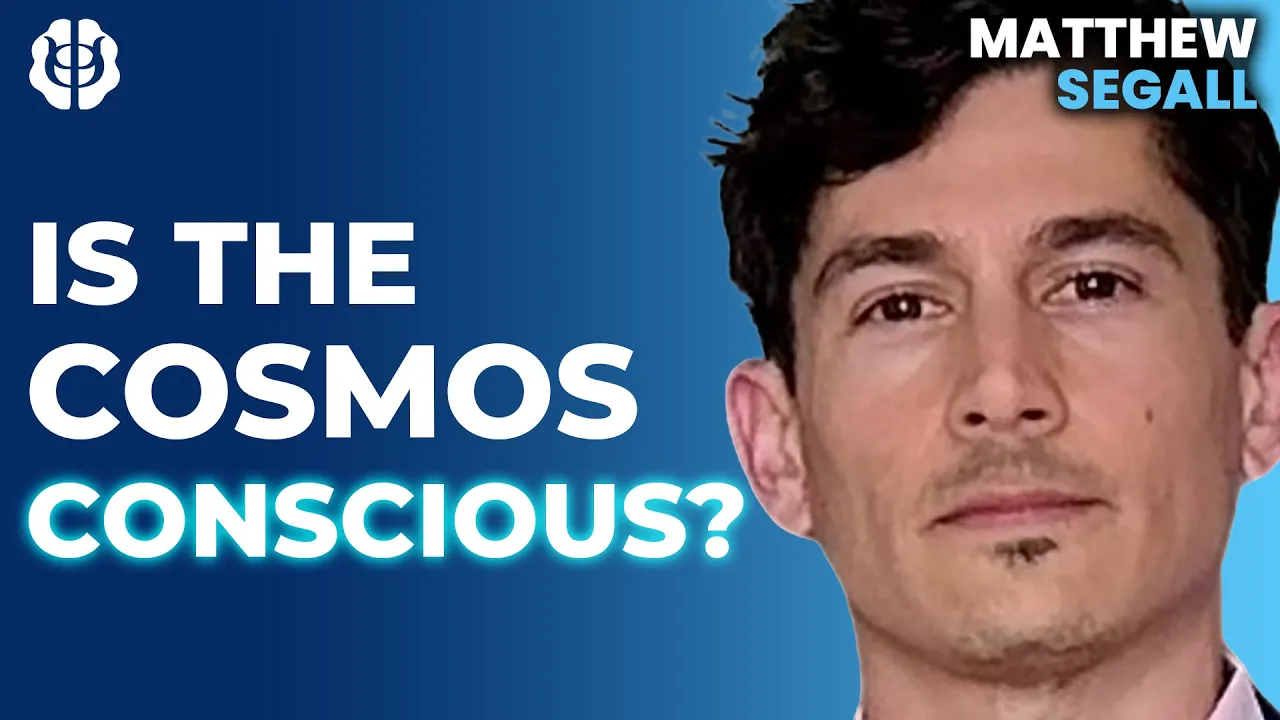Alfred North Whitehead's Metaphysics of Prehension: How Everything is Connected

Welcome to an exploration of the fascinating world of Alfred North Whitehead, a philosopher and mathematician whose ideas challenge our conventional understanding of reality. In this post, we'll delve into one of his most pivotal concepts: 'prehension.' This concept offers a new lens through which to view the universe – not as a collection of isolated objects, but as a dynamic network of interconnected events, where every entity, from the smallest particle to the largest organism, influences and is influenced by others. It's a radical departure from the traditional materialist view and offers a compelling framework for understanding causality and interconnectedness. Just as we explore complex topics on the Mind Body Solution podcast, we'll unpack the intricacies of Whitehead's philosophy and its implications for science, consciousness, and our understanding of existence itself. And speaking of the podcast, this blog post expands on the ideas discussed in our recent episode, Matthew Segall: Is the Universe Ensouled with Experience? Consciousness, Cosmology, and Meaning, where we talked with Dr. Segall about Whitehead and panexperientialism. We strongly recommend checking out the episode to hear more about Whitehead and his implications for how we understand consciousness!
Who was Alfred North Whitehead?
Alfred North Whitehead (1861-1947) was a British mathematician and philosopher. He initially made significant contributions to mathematics, co-authoring the monumental "Principia Mathematica" with Bertrand Russell. However, in his later years, Whitehead shifted his focus to metaphysics, developing a comprehensive philosophical system that challenged prevailing scientific and philosophical assumptions. His magnum opus, "Process and Reality," laid out his process philosophy, which emphasizes change, becoming, and interconnectedness as fundamental aspects of reality. Whitehead's work stands as a pivotal contribution to 20th-century thought, offering an alternative to deterministic and reductionist worldviews. His vision of an organic universe in constant flux has had a lasting impact on fields ranging from theology and environmental studies to systems theory and consciousness studies.
The Core Concept: What is Prehension?
At the heart of Whitehead's philosophy lies the concept of 'prehension.' This term, derived from the Latin word 'prehendere,' meaning "to grasp" or "to seize," represents the fundamental way in which entities relate to one another. For Whitehead, the universe is not composed of inert, isolated substances, but rather of dynamic, interconnected events called 'actual entities' or 'occasions of experience.'
Prehension is the process by which an actual entity takes account of, or 'grasps,' other entities within its environment. It is not merely a passive reception of information; rather, it is an active and selective process of integration. An actual entity 'feels' or 'experiences' the past actual entities that constitute its world and integrates these 'feelings' into its own becoming. This process of prehension is what constitutes the entity's experience and ultimately leads to its 'satisfaction,' or completion. In simpler terms, imagine a single moment in time for any entity. That entity is constantly absorbing or "prehending" information from other entities, constantly being affected by the world around it. This is a universal phenomenon, according to Whitehead, affecting everything from the smallest particle to the most complex organism. It's a fundamental building block of how the universe functions.
Breaking Down Prehension: How Entities Relate
To further understand prehension, it's helpful to break it down into its constituent parts. Whitehead identifies several key elements involved in this process:
- The Prehending Subject: This is the actual entity that is doing the prehending. It is the subject of experience, the one that is actively integrating data from its environment.
- The Prehended Object: This is the entity that is being prehended. It is the object of experience, the one that is contributing data to the prehending subject.
- The Datum: This is the specific aspect or quality of the prehended object that is being prehended. It is the information that is being transferred from object to subject.
- The Subjective Form: This is the way in which the prehending subject feels or experiences the datum. It is the subjective interpretation or valuation of the information being received.
These elements work together in a complex interplay to create the experience of an actual entity. The prehending subject selectively grasps aspects of its environment (the prehended objects and their data), and it integrates these aspects into its own being in a way that is shaped by its own subjective form. This process of integration is what gives rise to the entity's unique character and its contribution to the ongoing flow of reality. Importantly, Whitehead emphasizes that prehension is not a one-way process. The prehending subject is not merely a passive receiver of information; it actively transforms and integrates the data it receives. This transformation is what gives rise to novelty and creativity in the universe. As actual entities prehend and integrate aspects of their environment, they give rise to new forms of experience and new possibilities for the future.
Prehension vs. Perception: A Subtle Distinction
It's important to distinguish between prehension and perception. While both involve a relationship between a subject and an object, they differ in their scope and intensity.
Perception, in the traditional sense, typically refers to the conscious awareness of external objects through the senses. It is a relatively high-level cognitive process that is typically associated with complex organisms. Prehension, on the other hand, is a much more fundamental and pervasive process that occurs at all levels of reality. It is not necessarily conscious or intentional. Even the most elementary particles, according to Whitehead, engage in prehension.
Furthermore, perception is often understood as a relatively passive reception of information, whereas prehension is always an active and selective process of integration. The prehending subject is not simply registering the data it receives; it is actively transforming and integrating it into its own being. This active transformation is what distinguishes prehension from mere perception.
In essence, perception can be seen as a specialized form of prehension. It is a particular way of grasping and integrating aspects of the environment that is characteristic of complex organisms with developed sensory systems and cognitive capacities. Prehension, however, is the more fundamental and universal process that underlies all forms of experience.
Implications for Causality: A New Understanding
Whitehead's concept of prehension has profound implications for our understanding of causality. In the traditional view, causality is often understood as a linear, deterministic process in which one event directly causes another. This view often assumes that causes precede effects in a straightforward, predictable manner. Whitehead challenges this view, arguing that causality is a much more complex and nuanced process.
In Whitehead's framework, causality is not a simple matter of one event causing another. Instead, it is a matter of one actual entity prehending another. The past actual entities that constitute an entity's environment provide the data for its own becoming. These past entities do not directly cause the new entity to be what it is. Rather, they provide the material that the new entity integrates and transforms in its own unique way.
This means that causality is not deterministic in the traditional sense. The past does not completely determine the future. Rather, it provides a range of possibilities from which the present entity can choose. The present entity actively selects and integrates aspects of the past in a way that is shaped by its own subjective form. This subjective form introduces an element of novelty and creativity into the causal process.
Furthermore, Whitehead's concept of prehension emphasizes the interconnectedness of all things. Every actual entity is influenced by its environment, and every entity, in turn, influences its environment. This means that causality is not a one-way street. It is a reciprocal process in which entities are constantly shaping and being shaped by one another. This interconnectedness challenges the traditional view of causality as a linear, isolated process. It suggests that causality is better understood as a complex web of interactions in which everything is connected to everything else.
Panexperientialism: Experience Beyond Consciousness
One of the most controversial and intriguing aspects of Whitehead's philosophy is his commitment to panexperientialism. Panexperientialism is the view that all entities, not just conscious beings, possess some form of experience. This doesn't mean that a rock has the same level of consciousness as a human being, but it does mean that even the most elementary particles have some rudimentary form of feeling or awareness.
Whitehead argues that experience is not an emergent property that arises only in complex organisms. Rather, it is a fundamental aspect of reality that is present at all levels of existence. He bases this claim on the idea that reality is fundamentally composed of actual entities, and each actual entity is a process of prehension, a process of feeling and integrating data from its environment. Since prehension is a form of experience, and since all entities engage in prehension, it follows that all entities have some form of experience.
This view challenges the traditional Cartesian dualism that separates mind and matter. In the Cartesian view, mind is a separate substance that is distinct from matter. Only beings with minds, such as humans, are capable of experience. Whitehead rejects this view, arguing that mind and matter are not separate substances. Rather, they are different aspects of the same underlying reality. All entities, whether they are mental or physical, are composed of actual entities, and all actual entities have some form of experience.
Panexperientialism has significant implications for our understanding of the universe. It suggests that the universe is not a cold, dead, and meaningless place. Rather, it is a vibrant, dynamic, and experiential reality in which everything is interconnected and everything has some degree of awareness. This view offers a more holistic and integrated understanding of the cosmos. It suggests that we are not isolated observers in a meaningless universe. Rather, we are integral parts of a living, breathing cosmos that is constantly evolving and creating new forms of experience.
Whitehead and Science: Bridging the Gap
Whitehead's philosophy, while deeply metaphysical, is not divorced from the world of science. In fact, he explicitly sought to create a philosophical system that was compatible with the findings of modern science, particularly physics. He saw his philosophy as a way to provide a coherent and meaningful framework for understanding the scientific data.
One of the key ways in which Whitehead's philosophy bridges the gap with science is through its emphasis on process and change. Traditional science often focuses on static objects and fixed laws. Whitehead, however, argues that reality is fundamentally dynamic and that change is the defining characteristic of existence. This emphasis on process aligns well with the findings of modern physics, which has shown that the universe is constantly evolving and that even the most elementary particles are in a state of constant flux.
Another way in which Whitehead's philosophy connects with science is through its concept of interconnectedness. Traditional science often focuses on isolating and analyzing individual components of a system. Whitehead, however, argues that everything is interconnected and that the behavior of any entity is influenced by its environment. This emphasis on interconnectedness aligns well with the findings of systems theory, which has shown that complex systems are characterized by intricate webs of relationships and that the behavior of the whole is often greater than the sum of its parts.
Furthermore, Whitehead's panexperientialism, while controversial, can be seen as a way to address some of the fundamental problems in the philosophy of mind. The traditional materialist view of mind struggles to explain how consciousness can arise from purely physical processes. Whitehead's view, which posits that experience is a fundamental aspect of reality, offers a potential solution to this problem. It suggests that consciousness is not something that magically emerges from matter. Rather, it is a more complex and highly organized form of the experience that is present at all levels of existence.
Matthew Segall and Whitehead: Extending the Philosophy
Contemporary philosophers like Matthew Segall are actively extending and applying Whitehead's philosophy to new domains. Segall, whom we had the pleasure of interviewing on our podcast, is a leading voice in the field of process philosophy and its application to science, religion, and ecology. As noted in the show notes for the episode Matthew Segall: Is the Universe Ensouled with Experience? Consciousness, Cosmology, and Meaning, Segall’s work builds on the metaphysical framework of Alfred North Whitehead, extending Whitehead’s philosophy of organism into new domains of science, religion, and ecology. In doing so, Segall reinterprets the Western philosophical lineage – from ancient ideas of a world-soul to German Idealism and beyond – to articulate a participatory, organismic vision of nature. His philosophy portrays a cosmos ensouled with meaning and experience, challenging mechanistic materialism and inviting a renewed dialogue between science and spirit.
Segall's work demonstrates the continued relevance of Whitehead's ideas in the 21st century. By applying Whitehead's framework to contemporary issues, Segall is helping to keep process philosophy alive and relevant. His work is a valuable resource for anyone who is interested in exploring the implications of Whitehead's philosophy for our understanding of the world.
Challenging the Materialist View
Whitehead's metaphysics of prehension presents a powerful challenge to the dominant materialist worldview that has shaped much of Western thought. Materialism, in its simplest form, asserts that matter is the fundamental substance of reality and that all phenomena, including consciousness, can be explained in terms of material interactions.
Whitehead argues that materialism is inadequate because it fails to account for the dynamic and experiential nature of reality. Materialism tends to portray the universe as a collection of inert, lifeless objects governed by fixed laws. Whitehead, however, argues that the universe is fundamentally composed of dynamic, interconnected events that are characterized by experience. He challenges the materialist view that consciousness is merely a byproduct of complex material processes, arguing that experience is a fundamental aspect of reality that is present at all levels of existence.
By emphasizing the interconnectedness of all things, Whitehead also challenges the materialist tendency to reduce complex phenomena to their simplest components. Materialism often seeks to explain the behavior of complex systems by breaking them down into their constituent parts and analyzing their interactions. Whitehead argues that this approach fails to capture the emergent properties and holistic nature of complex systems. He emphasizes that the whole is often greater than the sum of its parts and that the relationships between entities are just as important as the entities themselves.
In essence, Whitehead's metaphysics of prehension offers a more holistic and integrated understanding of reality than materialism. It suggests that the universe is not a collection of isolated objects but a dynamic network of interconnected events, where everything influences and is influenced by everything else. This view has profound implications for our understanding of causality, consciousness, and our place in the cosmos.
Conclusion: Embracing Interconnectedness
Alfred North Whitehead's metaphysics of prehension provides a compelling alternative to traditional ways of understanding the universe. By emphasizing the interconnectedness of all things and the fundamental role of experience, Whitehead offers a framework that challenges the dominant materialist worldview and opens up new possibilities for understanding causality, consciousness, and our place in the cosmos. The concept of prehension, the active "grasping" and integration of past entities, reveals a universe where every moment is a creative synthesis, a becoming shaped by the influence of its predecessors but never fully determined by them. As we've seen, this philosophy has implications far beyond abstract metaphysics, reaching into science, ecology, and even our understanding of consciousness. It encourages us to see the world not as a collection of isolated objects but as a dynamic web of relationships, where every entity, from the smallest particle to the largest organism, is both influenced by and influencing the whole. This vision resonates deeply with many contemporary concerns, such as environmental sustainability and the quest for a more holistic and interconnected worldview. We hope this exploration has provided a deeper understanding of Whitehead's complex but rewarding philosophy. For a more in-depth discussion on these topics and how they relate to consciousness and cosmology, be sure to listen to our episode, Matthew Segall: Is the Universe Ensouled with Experience? Consciousness, Cosmology, and Meaning. We look forward to continuing this journey of discovery with you!








